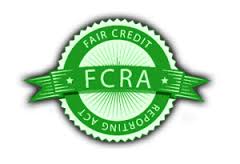 The Fair Credit Reporting Act (FCRA) is designed to promote accuracy, fairness, and privacy of information in the files of every “consumer reporting agency” (CRA). Most CRAs are credit bureaus that gather and sell information about you – such as where you work and live, if you pay your bills on time, and whether you’ve been sued, arrested, or filed for bankruptcy — to creditors, employers, and other businesses. The FCRA gives you specific rights in dealing with CRAs, and requires them to provide you with a summary of these rights as listed below. You can find the complete text of the FCRA, 15 U.S.C, 1681 et seq. at the Federal Trade Commission’s website.
The Fair Credit Reporting Act (FCRA) is designed to promote accuracy, fairness, and privacy of information in the files of every “consumer reporting agency” (CRA). Most CRAs are credit bureaus that gather and sell information about you – such as where you work and live, if you pay your bills on time, and whether you’ve been sued, arrested, or filed for bankruptcy — to creditors, employers, and other businesses. The FCRA gives you specific rights in dealing with CRAs, and requires them to provide you with a summary of these rights as listed below. You can find the complete text of the FCRA, 15 U.S.C, 1681 et seq. at the Federal Trade Commission’s website.You must be told if information in your file has been used against you. Anyone who uses information from a CRA to take action against you — such as denying an application for credit, insurance, or employment must give you the name, address, and phone number of the CRA that provided the report.
You can find out what is in your file. A CRA must give you all the information in your file, and a list of everyone who has requested it recently. However, you are not entitled to a “risk score” or a “credit score” that is based on information in your file. There is no charge for the report if your application was denied because of information supplied by the CRA, and if you request the report within 60 days of receiving the denial notice. You are also entitled to one free report a year if you certify that (1) you are unemployed and plan to seek employment within 60 days, (2) you are on welfare, or (3) your report is inaccurate due to fraud. Otherwise, a CRA may charge you a fee of up to eight dollars.
You can dispute inaccurate items with the source of the information. If you tell anyone — such as a creditor who reports to a CRA — that you dispute an item, they may not then report the information to a CRA without including a notice of your dispute. In addition, once you’ve notified the source of the error in writing, they may not continue to report it if it is in fact an error. Outdated information may not be reported. In most cases, a CRA may not report negative information that is more than seven years old; ten years for bankruptcies.
Access to your file is limited. A CRA may provide information about you only to those who have a need recognized by the FCRA — usually to consider an application you have submitted to a creditor, insurer, employer, landlord, or other business. ? Your consent is required for reports that are provided to employers or that contain medical information. A CRA may not report to your employer, or prospective employer, about you without your written consent. A CRA may not divulge medical information about you without your permission.
How You Can Fight Back
Raising Your Credit Score
- What Is a Paid Tradeline Alert? - August 24, 2023
- Why A Registered Agent LLC Is Best For Your Company - July 19, 2023
- The 5 Best Tradeline Companies of 2023: Compare Tradelines - June 2, 2023